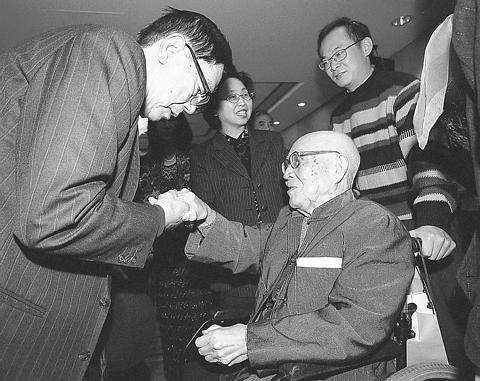Bo Yang (
Surrounded by family members, old friends and admirers, the long-time social critic spelled out his biggest wish, which was directed at Taiwan's younger generation.
"It's my deep hope our young people will be able to live with dignity. Dignity, as far as I'm concerned, can't be obtained through pride or wildness. Rather, it can only be established when we learn to always pay due respect to others," Bo Yang said.

PHOTO: AP
Bo Yang, whose satirical essays about Chinese culture have made him one of the most famous writers in Chinese literature, was born in China in 1920. He fled to Taiwan in 1949 after the defeat of the KMT.
Born in a turbulent era, Bo Yang does not know precisely on which day he was born. The outspoken writer nominated March 4, 1968, as his "day of rebirth" -- the day his incarceration at the hands of the KMT regime began.
In the 1960s, Bo Yang wrote a series of essays for newspaper columns. But it was his translations of an English-language comic in 1967, which were seen by the Chiang Kai-shek (
Bo Yang was finally freed from the notorious "Devil Island" in 1977, after persistent efforts by Sun Kuan-han (
Sun, an aging friend of Bo Yang, also appeared at his birthday party yesterday. Looking over his family members and dozens of friends, the writer said he was happy and called himself the "luckiest person in the world."
"It's the most glorious moment of my life," Bo Yang said delightfully. "Life was tough to me and during it I narrowly escaped from death several times."
"But thank God I have so many friends who have always given me a hand whenever I was in despair," he said. "They have shown me a lot of mercy. I can't name them all, but soon I'll write something to spell out my gratitude to them."
Bo Yang has produced more than 100 books -- including essays, novels, history, and poetry -- since the beginning of his writing career in the 1950s.
His famous book The Ugly Chinaman (醜陋的中國人), a collection of lectures and essays focusing on the conflict between traditional Chinese culture and the values of an industrialized West, spurred furious debate in Chinese communities throughout the world, and prompted responses from editors around the world.
His experience as a political prisoner has made him a long-time human rights advocate. And his efforts in that direction produced results last December when the first human rights monument in Asia was officially inaugurated on Green Island off the southeastern coast of Taiwan. The monument, which stands near the beach, is inscribed with a poem by Bo Yang, who himself spent nearly a decade on the island jailed in a notorious maximum-security facility.
Establishment of a monument there fulfilled his dream to see the Taiwan government admit the cruel reality of its past regime, he said.
And at his birthday yesterday, Bo Yang saw another dream fulfilled -- a new anthology of his past writings was released to mark the special day.

TRAGEDY STRIKES TAIPEI: The suspect died after falling off a building after he threw smoke grenades into Taipei Main Station and went on a killing spree in Zhongshan A 27-year-old suspect allegedly threw smoke grenades in Taipei Main Station and then proceeded to Zhongshan MRT Station in a random killing spree that resulted in the death of the suspect and two other civilians, and seven injured, including one in critical condition, as of press time last night. The suspect, identified as a man surnamed Chang Wen (張文), allegedly began the attack at Taipei Main Station, the Taipei Fire Department said, adding that it received a report at 5:24pm that smoke grenades had been thrown in the station. One man in his 50s was rushed to hospital after a cardiac arrest

SAFETY FIRST: Double the number of police were deployed at the Taipei Marathon, while other cities released plans to bolster public event safety Authorities across Taiwan have stepped up security measures ahead of Christmas and New Year events, following a knife and smoke bomb attack in Taipei on Friday that left four people dead and 11 injured. In a bid to prevent potential copycat incidents, police deployments have been expanded for large gatherings, transport hubs, and other crowded public spaces, according to official statements from police and city authorities. Taipei Mayor Chiang Wan-an (蔣萬安) said the city has “comprehensively raised security readiness” in crowded areas, increased police deployments with armed officers, and intensified patrols during weekends and nighttime hours. For large-scale events, security checkpoints and explosives

A car bomb killed a senior Russian general in southern Moscow yesterday morning, the latest high-profile army figure to be blown up in a blast that came just hours after Russian and Ukrainian delegates held separate talks in Miami on a plan to end the war. Kyiv has not commented on the incident, but Russian investigators said they were probing whether the blast was “linked” to “Ukrainian special forces.” The attack was similar to other assassinations of generals and pro-war figures that have either been claimed, or are widely believed to have been orchestrated, by Ukraine. Russian Lieutenant General Fanil Sarvarov, 56, head

PUBLIC SAFETY: The premier said that security would be tightened in transport hubs, while President Lai commended the public for their bravery The government is to deploy more police, including rapid response units, in crowded public areas to ensure a swift response to any threats, President William Lai (賴清德) said yesterday after a knife attack killed three people and injured 11 in Taipei the previous day. Lai made the remarks following a briefing by the National Police Agency on the progress of the investigation, saying that the attack underscored the importance of cooperation in public security between the central and local governments. The attack unfolded in the early evening on Friday around Taipei Main Station’s M7 exit and later near the Taipei MRT’s Zhongshan